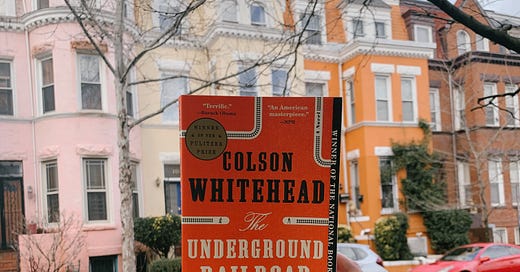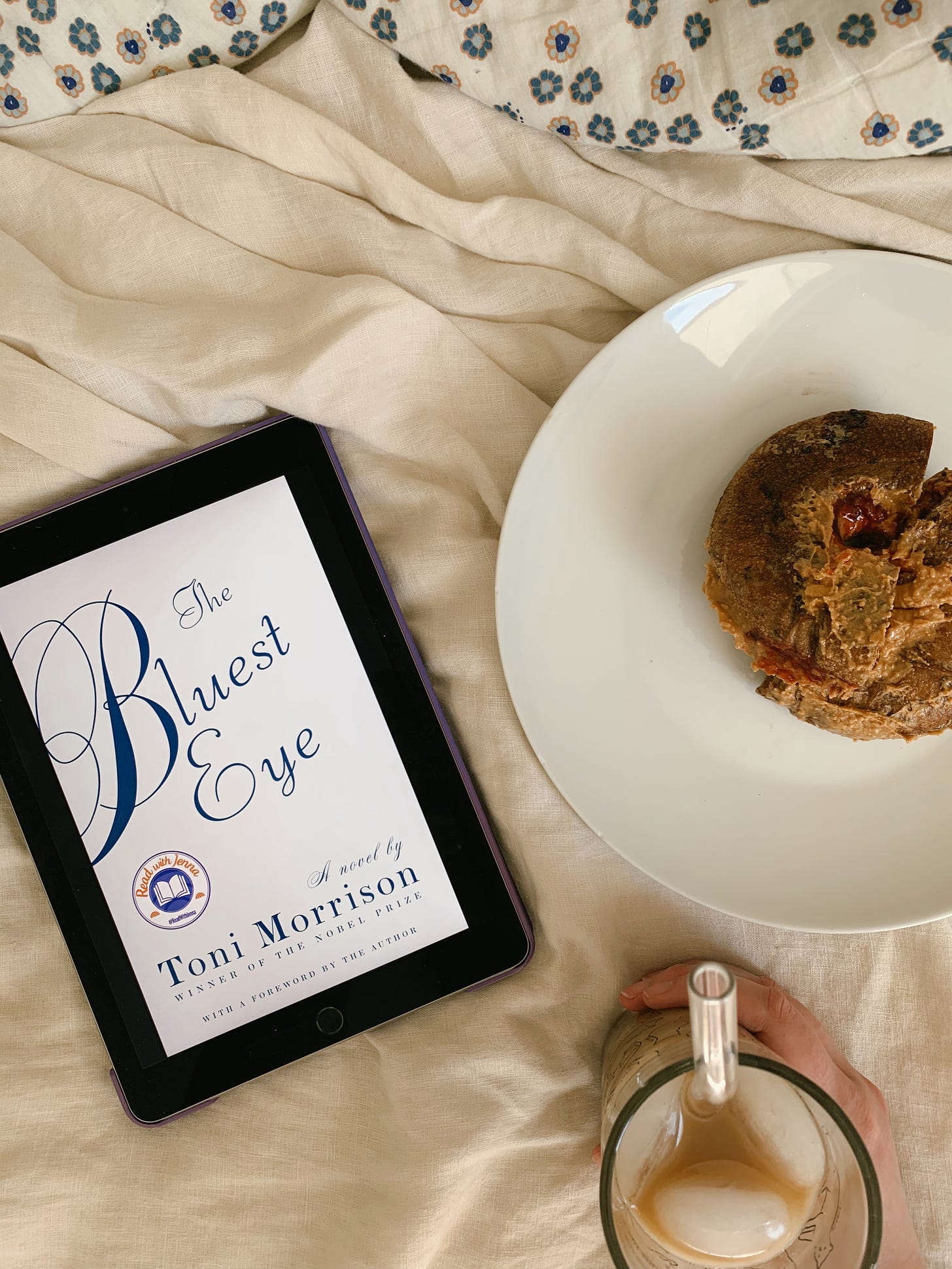Welcome to Steph Gets Lit, an unnecessary newsletter borne out of my not-at-all uncool and wildly popular @stephgetslit bookstagram account. There’s only so much I can post there, because ~insta etiquette~, so here we are — a place where I can be self-absorbed even more. This is very long, and I promise I’ll keep it shorter in the future.
A disclaimer: I am not a writer and I am very much not qualified to be screaming at you about anything, let alone books. Please don’t hate me!
The books part
I’ve finished two books this week, so you’re getting thoughts on both: The Underground Railroad by Colson Whitehead and The Bluest Eye by Toni Morrison. The former I’ve been meaning to read for years, and the latter is much overdue.
The Underground Railroad by Colson Whitehead
I’m very late to the game here — this book won a Pulitzer back in 2017 — and also I forget how to speak English when people ask me to articulate what I liked about a book, so I’m not ruining this book like that. I’m here to make a fool of myself, but not that much of a fool.
Unsurprisingly, I really liked this book. I loved the idea of a literal underground railroad, and while I have some logistical questions about train noise (I live in a city, I know how loud those subways are even aboveground), I thought it was executed very well. I love alternate realities, and while the fantasy element of this one made it a little less believable, it also drew me in.
It’s as sad and heavy as you’d imagine, but it has to be. Telling this story any other way would be unrealistic. And in a country that teaches its children a whitewashed narrative of enslaved people that’s manipulated for white people’s comfort, The Underground Railroad’s hopelessness felt necessary to me. When I was a kid, the real Underground Railroad was always taught (in the South, no less) in an uplifting way that completely ignored the reason an Underground Railroad was a thing in the first place. We saw cute cartoons of Harriet Tubman and Frederick Douglass, but rarely did we learn or think critically about the horrors of enslaving people — let alone the way racism is still perpetuated today.
I hope this book makes (white) readers think long and hard about the generational trauma that enslaving millions of people created and the ways that trauma is continually revisited even today. It’s easy for white people to look at slavery as a thing of the past, something we’re moving away from. But this country’s history is enslaving and torturing Black and brown people and justifying it however necessary, and we cannot untangle the present from the past.
A quote to that point that resonated with me:
“The white race believes—believes with all its heart—that it is their right to take the land. To kill Indians. Make war. Enslave their brothers. This nation shouldn’t exist, if there is any justice in the world, for its foundations are murder, theft, and cruelty. Yet here we are.”
Content warnings: very big one for slavery, but also: racism, misogyny, sexual assault, rape, child abandonment, death, emotional abuse, kidnapping, trafficking, torture, gun violence, murder, racial slurs (including many uses of the n-word)
An unrelated aside: I listened to Colson Whitehead’s Zone One, a 2010 novel about a zombie apocalypse in NYC, earlier this year. The concept was good, but the execution wasn’t my favorite. It felt slow and aimless at times, the characters were one-dimensional, and nothing really happened until the very end. The writing and editing of The Underground Railroad were completely different. This is why I love reading multiple works by the same author — to see the writing style evolve, for better or worse (better in this case!)
The Bluest Eye by Toni Morrison
This is another one where I’m not going to make a fool of myself by trying to say something original about an extremely well-written and popular book. Literally no one wants my dumb thoughts on Toni Morrison. I don’t want my dumb thoughts on Toni Morrison.
But she is a queen, and I’m committed to re-reading the books I didn’t appreciate when I was younger and reading the rest for the first time. So I’m obligated to say: This is a good, important book. It’s hard to get through in some parts because the subject matter is certainly not easy, but Morrison weaves her narratives together so masterfully. Her commentary about colorism within the structure of racism is just as relevant today as it was in 1970. It’s a topic that seems discussed more widely over this past year with the popularity of The Vanishing Half by Brit Bennett but has never gone away.
But I do have something to rant about because I cannot get over it: this damn Read With Jenna sticker. This is an e-book, borrowed from the library, and I STILL couldn’t get away from it! I know everyone got mad when this was first announced and it’s probably time for me to let it go, but I’m still mad!
Look, I don’t know Jenna Bush Hager or her politics (I mean, I could guess…), and I won’t make assumptions. I know there’s more to this, including a team of people working for her and an entire publishing house. Jenna’s Book Club has stuck its sticker on many a book, including some of my favorites, and she’ll stick it on many more great novels deserving of praise. Her endorsement can help launch authors’ careers, and that’s important to recognize. The Read With Jenna sticker (and the various others, from Oprah to Reese Witherspoon) is probably incredibly validating and helpful to writers, especially ones publishing debut novels.
But Toni Morrison didn’t need the help, approval, or validation being offered here. So I guess Jenna did what so many white women feel justified in doing — co-opting a Black woman’s work for her own personal gain! Congrats, girl! You did it!
And again — a Read With Jenna endorsement isn’t inherently a bad thing. But I am increasingly skeptical of the motives here. It feels a lot like performative allyship, where they’re just filling a quota of “diverse reads” so they have something to point to when they’re patting themselves on the back. But who knows!
Content warnings: racism, racial slurs, rape, incest, pedophilia, child abuse, child molestation, domestic violence, animal abuse
a side note on the bagel: it is almond butter and raspberry jam on a cinnamon raisin bagel from Call Your Mother Deli, and it was good
It’s Black History Month, and while I keep saying that we should be sure to read a variety of books by Black authors all year long, not just the ones about pain and suffering, I of course went and read two books back to back that are literally just about pain and suffering.
So here is my promise to do more! These are a few of the books by Black authors I’m excited to reading this year, only some of which are about pain and suffering:
Memorial by Bryan Washington
The Death of Vivek Oji by Akwaeke Emezi
The Prophets by Robert Jones Jr.
Caste: The Origins of Our Discontent by Isabel Wilkerson
Act Your Age, Eve Brown by Talia Hibbert, the third book in a very cute trio of contemporary romance novels about three sisters
The drinking and TV part
A “cocktail” I made this week to accompany my Monday night viewing of The Bachelor: spiked hot chocolate featuring vodka and pumpkin spice liqueur, because pumpkin spice season is apparently never over. You can make your hot chocolate with hot water, or milk if you’re luxurious and also don’t have IBS.
It’s probably not enough to get you through the two whole hours that ABC makes us sit through for a show that gets more chaotic and problematic by the season. This year’s is no different. Sorry but are we still really doing this mean girl shit in 2021? It. Is. Exhausting.
But nothing in the Bachelor universe is as exhausting as Chris Harrison, while speaking with the franchise’s first Black bachelorette, defending the racist behavior of a contestant and then issuing a generic Notes app apology when people tried to hold him accountable. The irony of Chris getting canceled after whining about cancel culture is too good, though.

The reading part
What else I‘ve read this week:
I started Milk Fed by Melissa Broder, which is one of my most-anticipated new releases this year
The Drift’s piece on strong female leads and the “Reese Witherspoon literary canon,” which was v interesting and also coined my new favorite genre: diminutive fiction
Ali Barthwell’s Bachelor/ette recaps are the best part of my Tuesdays, other than checking bachbracket.com to see how far I’ve fallen in the scoring this week
This New Yorker article that calls my new favorite reality show, The Real Housewives of Salt Lake City, “culturally sensitive trash” (here for it)
Confusing internet person Caroline Calloway started a bookstagram account, and I am both monitoring it obsessively and watching in muted horror
The publishing part
A few books that were published this past Tuesday (Feb. 9) that I want to read:
We Run the Tides by Vendela Vida
Under a White Sky: The Nature of the Future by Elizabeth Kolbert
Sorrow and Bliss by Meg Mason (this is the U.S. release — it was published originally in Australia in 2020)
And a few publishing this upcoming week (Feb. 16) that I’m excited for:
No One is Talking About This by Patricia Lockwood
The Echo Wife by Sarah Gailey
Dark Horses by Susan Mihalic
How to Order the Universe by María José Ferrada
Okay well that’s it I guess. Thanks for reading this far, and thanks even if you didn’t read this far and have just scrolled to the bottom. Love u xoxo





